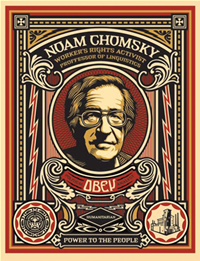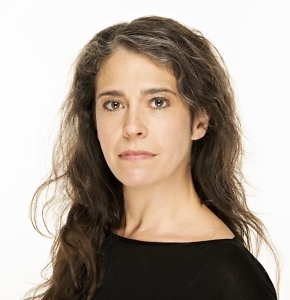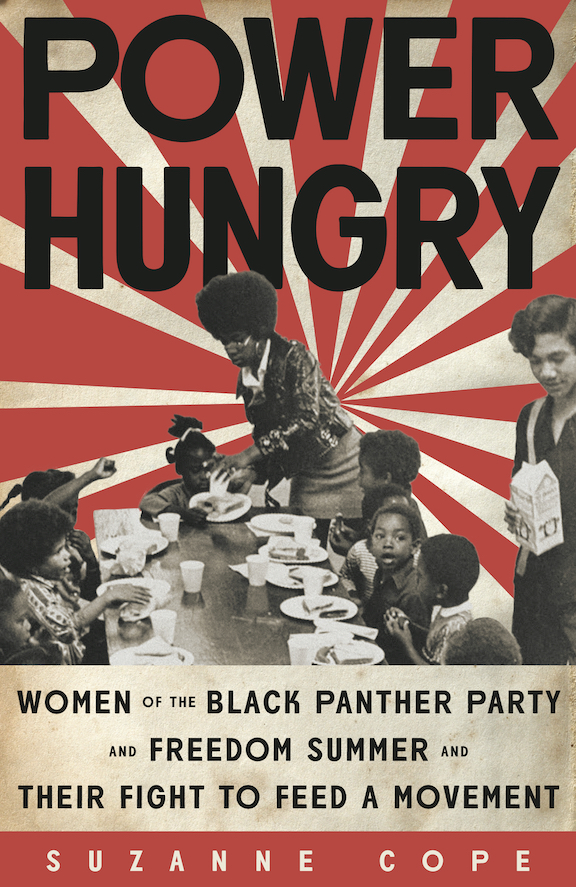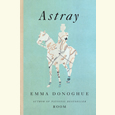The People’s Philosopher
Noam Chomsky talks with Chapter 16 about the Occupy movement, the language of popular culture, and Gen Y
Noam Chomsky is a scholar whose ideas are too big to be contained by one discipline. During the mid-1960s, his theory of universal grammar—which holds that basic language structure is largely innate and universal—changed forever the debate about language acquisition. Chomsky’s search for such “deep structures” led to a drastic change in the human sciences, providing philosophers and psychologists a new way to think about the mind.
Chomsky became a household name not for his scholarship, however, but for the political implications of his work, which have earned him a listing in the International Encyclopedia of Revolution and Protest. Beginning with his opposition to the Vietnam War, he has emerged as one of the left’s most implacable voices, challenging the often hidden structures that lie behind the abuse of power. He has published so many books in his long career that it requires a significant investment of time just to count them. His most recent book, A New Generation Draws the Line, untangles the ethics of human intervention in global conflict. In his forthcoming collection of essays, Making the Future: Occupations, Interventions, Empire and Resistance, Chomsky considers all the major political events of the past four years, including the wars in Afghanistan and Iraq, Israel’s invasion of Gaza, the Arab Spring, the world financial crisis, and the Occupy movement, among others. Chomsky recently answered questions via email from Chapter 16.
Chapter 16: One of the principles of linguistic theory holds that humans can learn a language when placed in a corresponding speech community. Slurred speech, incomplete sentences, and mispronunciations are considered an impediment to such learning. The language of popular culture, it seems, is nothing but mispronunciations, half-sentences, and technological shorthand (LOL and the like). What does this trend say about the future of language acquisition in America?
 Chomsky: An infant is faced with what William James famously called a “blooming buzzing confusion,” and somehow has to extract out of it significant information and to organize it into coherent systems of knowledge, belief, attitude, evaluation, and much more. In the case of language, the child first of all has to extract information that is relevant to language—a hard enough task, barely understood, and clearly beyond the capacity of other organisms, even primates with essentially the same auditory systems. Having accomplished this somehow, the child has to work through data that is commonly quite complex, even apart from the factors that you mention: typically a child is exposed to different styles and different speech communities, and, in many cultures, to quite a few different languages.
Chomsky: An infant is faced with what William James famously called a “blooming buzzing confusion,” and somehow has to extract out of it significant information and to organize it into coherent systems of knowledge, belief, attitude, evaluation, and much more. In the case of language, the child first of all has to extract information that is relevant to language—a hard enough task, barely understood, and clearly beyond the capacity of other organisms, even primates with essentially the same auditory systems. Having accomplished this somehow, the child has to work through data that is commonly quite complex, even apart from the factors that you mention: typically a child is exposed to different styles and different speech communities, and, in many cultures, to quite a few different languages.
But remarkably, none of this seems to have much of an effect, as long as the child is growing up in a supportive, loving environment. There are similar conclusions about growth and development in other domains, and other organisms. All of this raises highly interesting problems for the sciences, linguistics among them. It seems quite unlikely, however, that the aspects of popular culture that you mention will have more than a marginal impact, at most, on language acquisition—which has reached something close to a mature state before these effects even intrude.
Chapter 16: I’m wondering what you think of the Occupy Movement, an inchoate collection of assemblies whose most unifying principle is Throw the bastards out! Do you see Occupy’s lack of organizing principles as an asset, a liability, or both?
Chomsky: I do not think that is quite an accurate description. The newspapers of Occupy Wall Street and other Occupy movements contain many clear proposals, ranging from specific ones on fiscal policy and other immediate issues to much longer-range ideas about socio-economic and political organization. It is true that they have not tried to impose a Party Line, unlike, for example, today’s Republican Party, which insists on virtual lock-step uniformity in intoning a specific catechism, something rather new on western parliamentary democracy and reminiscent in some ways of the old Communist parties. I think that openness and flexibility is a good thing, generally. There is, however, a danger of breaking up into “an inchoate collection of assemblies,” given the insistence on democratic participation and rejection of authoritarian and hierarchical structure. Issues to be concerned about, no doubt.
Chapter 16: Gen Y has been characterized as ambitious yet questioning: less likely than the previous generation to accept authority carte blanche and more likely to seek meaningful work, relationships, etc. In short, it’s been suggested that this generation has been hyped to death, and now they’re over it. You’ve devoted considerable energy in addressing the ways that politicians and the media influence the way we think; are you at all more hopeful about this generation than others?
 Chomsky: Such characterization of “generations” have always seemed rather dubious to me. There are periods, like the 1950s, marked by relatively little questioning of authority. That changed considerably in the ’60s and has expanded since. Consider for example the women’s movement, which has probably changed the society more substantially than any other. It has roots going far back, but really expanded dramatically since the 1970s, often with young people in the lead. The same is true of the environmental movement, far in the margins in the ‘60s. The global- justice movements have proliferated in the last decade, again largely among young people. Past predictions have not had a very impressive record of success, to put it mildly, and I don’t see any reason to expect that to change. Too much in human affairs depends on will and choice.
Chomsky: Such characterization of “generations” have always seemed rather dubious to me. There are periods, like the 1950s, marked by relatively little questioning of authority. That changed considerably in the ’60s and has expanded since. Consider for example the women’s movement, which has probably changed the society more substantially than any other. It has roots going far back, but really expanded dramatically since the 1970s, often with young people in the lead. The same is true of the environmental movement, far in the margins in the ‘60s. The global- justice movements have proliferated in the last decade, again largely among young people. Past predictions have not had a very impressive record of success, to put it mildly, and I don’t see any reason to expect that to change. Too much in human affairs depends on will and choice.
Chapter 16: You’ve been very critical of postmodernism, labeling it a “cult” whose theories are obvious truisms dressed up in obscure language. You’ve also criticized academics, sometimes preferring the opinions of laypersons, whose insights may be more in touch with real world issues. Doesn’t postmodernism—with its insistence on culturally located truth—provide ammunition to support the layperson’s opinion, the validity of which may be far removed from academic life?
Chomsky: There are contributions of postmodernism that are coherent and not simply truisms dressed up in complex and self-promoting rhetoric, and those should be taken seriously. But as far as I can tell, they are scattered. Take “culturally located truth.” In the first place, truth is not determined by cultural location—which, however, plays a significant role in determining what one looks for, how evidence is evaluated, etc. That, however, verges on truism. The concept, therefore, seems to me to be part falsehood, part truism, when decoded—or “deconstructed,” to use the fashionable term. On “the opinions of laypersons,” or academics, they have to be evaluated on their merits. It is, I think, often true that popular opinion is far more sane than official doctrine (often supported by professionals). I’ve discussed many examples. There are also many examples to the contrary, some with very dangerous import.
Chapter 16: You’ve been quoted as saying that this country’s two parties are really just one: the Business Party. That sentiment seems to be shared by an increasing number of Americans who describe feeling alienated at the ballot box. If in present circumstances we only have the illusion of choice, is there any reason to take the time to vote?
Chomsky: More precisely, what I’ve said (echoing C. Wright Mills and others) it that there is one Business Party with two factions, which differ somewhat in constituencies, financial support, and policies. People have good reason to feel alienated insofar as both of the factions respond not to popular concerns but to powerful sectors of concentrated capital, as is all too often the case (and again well documented). But even among unwelcome alternatives there is sometimes reason to choose—while working, at the same time, to overcome the institutional constraints.
Chapter 16: Is it conceivable to you that the United States might one day elect a president who is not a product of the privileged classes, by birth or education?
Chomsky: That is quite possible, right now, as long as the person accepts the dictates of concentrated economic-political power. Real life is too complicated to be captured completely in simple slogans, but there is quite considerable empirical support for what political economist Thomas Ferguson calls “the investment theory of political parties,” which interprets elections in substantial measure in terms of coalitions of investors combining to control the state.
Noam Chomsky will speak at Rhodes College in Memphis on January 13 at 5 p.m. in the McCallum Ballroom.





